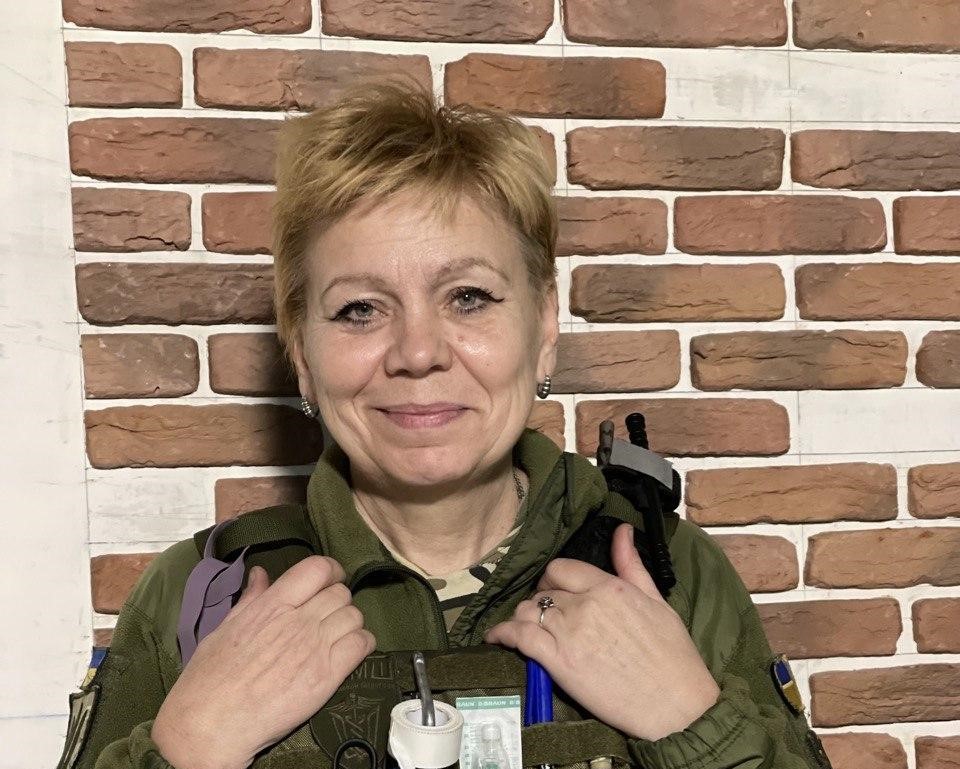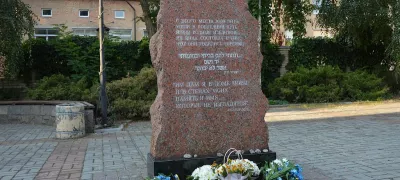
Irina Babych is a nurse from Poltava region with 40 years of experience. Since 2015, she has been a volunteer at the First Volunteer Mobile Hospital named after Mykola Pyrohov, and she currently saves our defenders on the most dangerous frontlines. She holds the status of a war participant and has been honored with numerous state and non-state awards. Read on for her most challenging evacuations and her attitude towards women on the frontlines.
Mrs. Irina was an active participant in the Maidan protests, where she first witnessed the deaths of young men. This enraged her because she believed it was wrong to treat unarmed people this way. When she heard people blaming the Maidan protests for the war, she made the logical decision to volunteer on the frontlines. From 2015 onwards, Irina Babych began rotations at the First Volunteer Mobile Hospital named after Mykola Pyrohov. She spent nearly a year on rotations, six months in an evacuation hospital in Chasiv Yar, Bakhmut district of Donetsk region, and another six months in the 'grey' zone. In 2017, the fighting subsided, and she returned home.
Everything changed on February 24, 2022. - In the early days of the full-scale war, I joined the Poltava Territorial Defense. I insisted all the time that I wanted to go on combat missions. However, they assigned me to be a cook, and I worked in the kitchen for three months. I learned to cook for 120-150 people in a field kitchen. I wrote requests for transfers, but they kept rejecting me. I even approached a commander personally, and he didn't want to hear me out," the nurse recounts.
Later, Irina had the opportunity to leave due to her age, and the next day, she joined the ranks of volunteers at the First Volunteer Mobile Hospital named after Mykola Pyrohov. Irina Babych says that unlike the local territorial brigade, she never felt any prejudice against her on the frontlines. On the contrary, the fighters treat volunteer medics with pride and respect. - Despite being volunteers, we have clear subordination. We work according to protocols. However, the Ukrainian Armed Forces are more demanding of us. In case of a mistake, they would say, 'Sorry, we can manage without you.' So we have no right to fail to evacuate, do something wrong; we hand over a stabilized and prepared soldier so that they can take them to the operating table immediately and then transport them further," says the nurse.
According to Mrs. Irina, working as a medic on the frontlines during full-scale war is much more challenging. In 2014-2015, there were more gunshot and bullet wounds. Now, there are many shrapnel injuries. The combat actions are very brutal; it's a completely different war. - Our work is very dynamic and extreme. Yesterday, we evacuated four wounded soldiers, two of them in critical condition. But we managed to bring them all back. I'm often asked, 'What do you think about on the road?' I answer, 'To get them there.' Irina Babych says that often, when it seems impossible to save a person, she manages to do so thanks to experience. - Perhaps it comes with experience because I've been here for almost a year. I have 40 years of experience as a general practice nurse at the Kobelyaky Central District Hospital. About 20 years of that, I worked in the day hospital and combined it with work at the blood transfusion station," Irina Babych explains.
She says that it's not always comfortable to work with paramedics because sometimes romantics with lots of theory and zero practice come to the front. - So, it was difficult for me to work with them because when you have a professional medic by your side, it's much easier to work. But when you have to explain, it takes time," says Mrs. Irina. Irina Babych mentions that at the beginning of the war, there was a shortage of professional medical specialists, and sometimes combat medics worked without the proper education. Now, there are enough specialists, but the workload on them is enormous. Sometimes, up to 100 people are evacuated in a month.
"I once evacuated over 20 people in a day, and towards the end, I could hardly understand anything. I wrote down the medications administered to the soldiers on their arms because I couldn't physically remember everything. We drive to the woods for about one and a half hours, pick up the guys, then take them to the transfer point and drive back. And sometimes, we repeat this several times. One evacuation can take about three hours, and in the car, we take a maximum of 10 people. In theory, only two are lying down; the rest sit. Although I once took three lying down because they were all in critical condition," the nurse explains.
Volunteer medics often find themselves in life-threatening situations. Once, they were fired upon at the evacuation point because it was located very close to the front line. - We just couldn't get out of the bunker. There were no hits, thank God, but we worked very closely in our square," Irina Babych recalls.
Often, the nurse's role goes beyond providing urgent medical care; they also function as psychologists to some extent, and the journey during evacuations can feel too long. - We transport both the wounded and the deceased because it's in the woods, and there's no possibility to leave the deceased behind. I remember evacuating a 20-year-old guy with a hand injury and a 19-year-old 'two-hundredth.' It was his friend. The soldier was crying so much that we had to put him in the cab and administer a sedative. I tried to talk to him the whole way; it was tough," Mrs. Irina recounts.
Another time, the medics were transporting a guy with eye injuries and his 'two-hundredth' blood brother. The soldier couldn't see anything and kept asking, "Did they take my comrade? Is he alive?" The deceased was lying nearby, and the volunteers couldn't tell the wounded soldier about it. - And just recently, we evacuated five or six people. There was a deceased soldier among them too. The seriously wounded guys were on stretchers, and the others were sitting. We had to place the 'two-hundredth' between them. The guy sat by the door and cried. I asked, 'Does it hurt?' He replied, 'No, it's my friend.' We talked to him on the way; it was tough," the nurse says.
Irina Babych emphasizes that they always listen to the soldiers, comfort them, and talk to them. "Will I survive?" - "Yes, you will. We will get you there." You inquire about their families, and you see their eyes light up. You distract them while secretly thinking, 'God, I hope this journey ends soon.' Over this year, we have brought everyone back alive, and I'm very proud of that," she adds.
Mrs. Irina says that she adapted to dealing with deaths since the time of the Maidan protests. There is no depression among the volunteers on the frontlines; those who can't handle it just don't return. - I don't know what I'll do when the war ends: cry or laugh, but it won't just pass. I think it will be very hard for all of us after the victory. Psychologists will have plenty of work for decades," the volunteer concludes.

вологість:
тиск:
вітер:
0 Comments
To add the comment